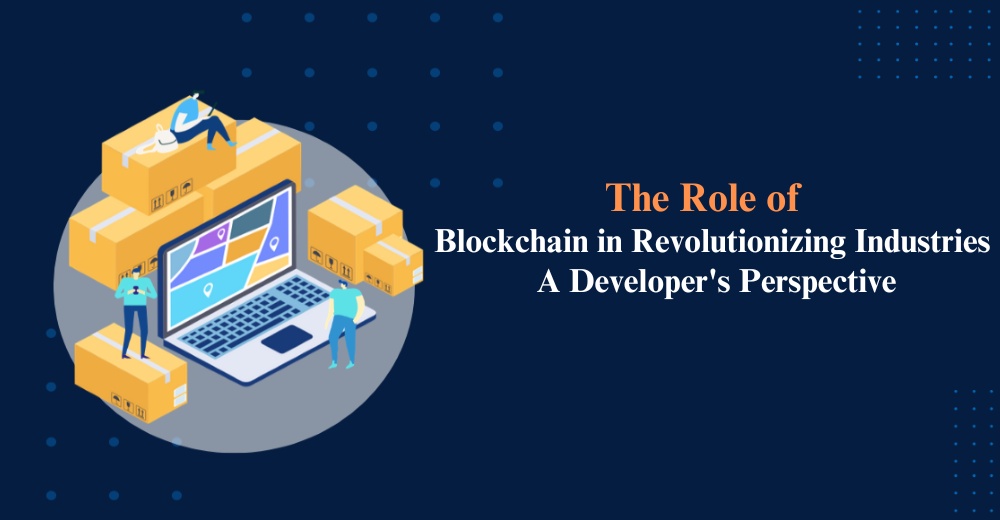Blockchain, once synonymous with cryptocurrencies, has evolved into a disruptive force across sectors. This series explores how blockchain technology is fundamentally reshaping industries by enhancing security, transparency, and efficiency. We uncover real-world use cases across finance, supply chain, healthcare, and more, shedding light on how decentralized ledgers are challenging traditional norms. From smart contracts streamlining processes to tamper-proof data ensuring trust, we navigate the intricate landscape of blockchain's impact.
In this blog, we’ll understand the developer's perspective on the potential, hurdles, and exciting possibilities that blockchain brings to the forefront of innovation.
Role of Blockchain in Revolutionizing Industries: Overall Developer's Perspective
Few technological advancements have attracted as much attention or potential as blockchain. Blockchain technology was first developed as the basis for digital currencies like Bitcoin, but it has since evolved and is transforming a wide range of sectors.
The influence of blockchain is clear across industries like finance, healthcare, and supply chain management. This blog will examine the crucial part that blockchain has played in reshaping several industries, all from the singular viewpoint of a developer.
1. Decentralization and Trust:
The decentralized nature of blockchain is at the core of its transformative potential. Traditional systems have single points of failure and inefficiency because they rely on centralized entities for control and verification. Contrarily, blockchain evenly distributes power among a network of nodes, promoting trust, security, and transparency. This is especially important in sectors like supply chain management and banking, where every transaction is securely recorded, obviating the chance of fraud or manipulation.
2. Supply Chain Disruption:
The supply chain sector is where blockchain is having one of its most noticeable effects. Every stage of a product's lifecycle, from creation to consumption, is transparent and traceable because of the blockchain's immutable record. This improves accountability, lowers fraud, and guarantees product authenticity. As a developer, you must have experience building secure, interconnected networks that provide precise monitoring and data integrity in order to create blockchain solutions for supply chain management.
3. Financial Evolution: Beyond Cryptocurrencies:
While cryptocurrencies made blockchain popular, its applications go far beyond virtual currency. Blockchain aids the banking sector by enhancing cross-border transaction efficiency, enhancing security, and streamlining operations. The creation of smart contracts is essential in this regard. These automatically enable, verify, or enforce contract negotiations or performance under these self-executing contracts. Mastering smart contract development as a developer provides doors to establishing safe, automated financial procedures.
4. Healthcare Transformation:
Blockchain has become a game-changer in the healthcare industry, where data privacy and interoperability are critical requirements. Clinical trial data, patient records, and medical histories can all be safely maintained and distributed to authorized parties. This guarantees data accuracy, lowers administrative expenses, and makes it possible to precisely track patient treatment. Blockchain solutions for the healthcare industry must be developed with a thorough grasp of data security, encryption, and compliance with laws like HIPAA.
5. Tokenization and Crowdfunding:
Tokenization, which enables the representation of assets, ownership, or value in a digital format, was introduced by blockchain. Initial Coin Offerings (ICOs) and Security Token Offerings (STOs), which have disrupted conventional fundraising techniques, have been made possible as a result. As a developer, you participate in the creation of smart contracts that control the creation and distribution of tokens as well as their security.
The Need for Expertise: Hiring Blockchain Developers:
Industries are actively looking for experienced developers who are familiar with the subtleties of blockchain technology in order to fully realize its potential. Companies are searching for qualified individuals to develop reliable and secure blockchain applications. The importance of working with a trustworthy blockchain development company cannot be overstated if your company is considering adopting blockchain technology or trying to incorporate it into current systems.
Choosing the Right Blockchain Development Company:
It's crucial to pick the right partner when it comes to blockchain development. A trustworthy blockchain development company contributes knowledge, experience, and a portfolio of completed projects. They can assist you in finding the greatest use cases for your sector, developing specialized solutions, and smoothly putting them into use. A knowledgeable blockchain development business has the knowledge and abilities to realize your goal, whether it involves supply chain optimization, financial advances, or healthcare transformations.
How to Hire the Right Blockchain Development Company?
Hiring the right blockchain development company is a critical step in harnessing the transformative power of blockchain technology for your business. With the potential to revolutionize industries through enhanced security, transparency, and efficiency, choosing the right partner can make all the difference. Here's a comprehensive guide to help you navigate the process effectively.
1. Define Your Project Scope:
Start by clearly defining your project's goals, requirements, and scope. Determine the specific blockchain solutions you need, such as smart contracts, decentralized applications, or tokenization. A well-defined scope will help you communicate your needs more effectively to potential development partners.
2. Research and Shortlist:
Conduct thorough research to identify potential blockchain development companies. Look for companies with a solid track record in blockchain development, relevant industry experience, and positive client reviews. Create a shortlist of companies that align with your project's requirements and objectives.
3. Evaluate Expertise:
Assess the expertise and skill set of the development team. They should have a deep understanding of blockchain technologies, programming languages (e.g., Solidity for Ethereum), and experience in developing similar projects. Request case studies or examples of their previous blockchain work to gauge their proficiency.
4. Technology Stack:
Inquire about the technology stack the company uses for blockchain development. Ensure they are up-to-date with the latest tools and frameworks. A proficient team should be able to work with various blockchain platforms such as Ethereum, Hyperledger, Binance Smart Chain, and others.
5. Transparency and Communication:
Effective communication is crucial for the success of any project. Look for a company that values transparency and maintains open lines of communication. They should provide regular updates on the project's progress and be receptive to your feedback and input.
6. Portfolio and References:
Review the company's portfolio to see if they have worked on projects similar to yours. Ask for references from previous clients to gain insights into their working relationship, project management, and overall satisfaction with the company's services.
7. Industry Experience:
Consider partnering with a company that has experience in your industry. Blockchain applications can vary significantly between sectors, and a company with domain knowledge will better understand your specific needs and challenges.
8. Security Measures:
Security is paramount in blockchain development. Inquire about the company's security practices, including how they handle private keys, data encryption, and vulnerability assessments. A reliable company should prioritize the protection of sensitive information.
9. Scalability and Performance:
Ensure the company can design solutions that are scalable and performant, especially if you anticipate growth in user base or transaction volume. Scalability is a crucial consideration for blockchain applications.
10. Cost and Timeline:
Obtain detailed quotes from the shortlisted companies, outlining the cost breakdown for development, testing, deployment, and ongoing maintenance. Compare the quotes in relation to the services offered. Additionally, discuss the estimated timeline for project completion.
11. Flexibility and Adaptability:
Blockchain technology is still evolving, and requirements might change over time. Choose a development company that is flexible and adaptable to accommodate changes and updates as the project progresses.
12. Legal and Regulatory Compliance:
Blockchain projects often involve legal and regulatory considerations, especially if you're dealing with sensitive data or financial transactions. Ensure the company has a good understanding of relevant regulations and compliance requirements.
Conclusion:
Developers are essential to guiding the development of blockchain technology as more sectors adopt it. Blockchain technology has the ability to completely transform businesses thanks to its decentralization, transparency, and security. Blockchain has a broad and prospective impact on everything from supply networks to finance, healthcare, and crowdfunding. Partnering with the best blockchain development company or hiring blockchain developers can help organizations who want to take advantage of these advantages unlock creativity and maintain competitiveness in a market that is changing quickly.


No comments yet